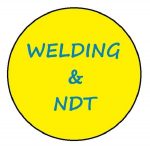1. Overlap in welds could be influenced by:
- Welding process
- Welding position
- Poor welding technique
- All the above
2. In MAG/CO2 welding which parameter gives the greatest control of weld appearance during dip transfer or short-circuiting welding?
- Wire stick-out length
- Welder’s convenience
- Wire feed speed
- Inductance
3. In X-ray work the quality of the radiographic image is assessed by the:
- The density of the film
- IQI indicator
- KVA available
- Stand-off distance
4. In Shielded Metal arc welding what parameter is used for control of penetration into the base material?
- Voltage
- Welding speed
- The gravitational pull of the earth
- Current
5. Welds made with damaged electrode coatings in Shielded metal arc welding will lead to:
- Porosity
- Undercut
- Excessive penetration
- Excessive bead height
6. What is the most common cause of failure in root bend tests?
- Improper mandrel setting
- Improper electrode holder
- Lack of fusion and penetration
- Too high a travel speed
7. When steel is heated to above its upper critical temperature, the structure produced is:
- Martensite
- Austenite
- Pearlite
- Ferrite
8. Which of the following can arise from copper inclusions in a mild steel weld?
- Weld metal cracks
- HAZ cracks
- Lack of fusion
- Porosity
9. An electro slag weld requires what heat treatment to improve the grain structure?
- Annealing
- Stress relieving
- Normalizing
- Quench and tempering
10. An austenitic stainless steel may suffer:
- Weld decay
- Sensitization
- Solidification cracking
- All the above
11. Ultrasonics would be preferred over radiography due to:
- Ability to find most defects
- Lower skill requirement
- Ability to detect laminations
- Both a and c
12. Generally the most suitable method of detecting lack of sidewall fusion would be:
- Ultrasonic Test
- MPI
- Radiography
- Penetrant inspection
13. Repair welding is often more difficult than production welding due to:
- The material being ingrained with in-service contaminants
- Restricted access within the repair area
- The possible position of the weld repair
- All the above
14. Flame cut preparations may, during welding, increase the likelihood of:
- Cracking
- Misalignment problems
- Inclusions
- All the above
15. A welding procedure is useful to:
- Give information to the welder
- Give information to the inspector
- Produce sound welds
- All the above
16. From the following electrode coding E50 4 B 160 20 H5, the compulsory part is:
- E50 4 B 160 20 H5
- B 160 20 H5
- E50 4 B
- None of the above
17. During TIG welding of Austenitic Stainless Steel pipe, Argon gas baking is used to:
- Prevent oxidation
- Prevent under bead cracking
- Prevent porosity
- Control the penetration bead shape
18. A welder qualification test is carried out to verify:
- The skill of the welder
- The quality of the materials
- The non-destructive test procedures
- The manufacturing method
19. The unit of Joules would be used to measure:
- Tensile strength
- Impact energy
- Hardness
- Electrical resistance
20. Submerged arc welding is a process that generally gives:
- Slag free welds
- Low penetration
- Low dilution
- High heat input
21. When measuring the welding parameters with the MMA welding (SMAW) process for approval of welding procedure, the Welding inspector should measure the voltage:
- As close to the welding arc as possible
- Anywhere along the welding cable
- Always from the voltmeter on the welding plant
- As near to the welding terminals as possible
22. In arc welding process, which of the following is the correct term used for the amount of weld metal deposited per minute?
- Filling rate
- Deposition rate
- Weld deposition
- All of the above
23. Which electrode is most suitable for welding of low alloy steels with MMA welding process:
- Basic hydrogen controlled electrodes
- Rutile electrodes
- Cellulosic Electrodes
- Iron powder electrodes
24. Initiation of a TIG arc by using a High Frequency (HF) spark may not be allowed for some application because
- It can damage electronic equipment
- It causes tungsten inclusion
- It is an electrical safety hazard
- All of the above
25. Which of the following is likely to give the highest impact strength in ferritic weld metal?
- Basic coated normal metal arc electrodes
- Cellulosic electrodes
- Both A and B
- Neither A nor B
26. Which type of power source characteristics is normally used for manual welding?
- Constant welding
- Flat characteristics
- Constant current
- A motor-generator
27. Which NDT method can be used to detect the surface as well as the sub-surface defects?
- Radiography
- Magnetic particle
- Penetrants
- Ultrasonic flaw detector
28. When hydrogen control is specified for a manual metal arc-welding project the electrode would normally be:
- Cellulosic
- Iron oxide
- Acid
- Basic
29. The steel composition in the structural contract is changed from 0.15% carbon, 0.6% manganese, to 0.2% carbon, 1.2% manganese. Might this influence the incidence of?
- Cracking in the weld area
- Porosity
- Undercut for fillet welds
- All of the above
30. For open site manual metal arc welding the following equipment is available. Which would you choose for safe working?
- Diesel engine driven motor-generator
- Single operator transformer
- Multi operator transformers
- All of the above
Also read: Welding Symbols
Also read: Welding Electrodes
Also read: Welding Defects
Also read: TIG Welding


I am interested to do this course. Now I am working as a welder since 2008 still now. Is this possible for me
Your study material is very good.
Interesting…
Nice afforts you have been put to complete this…
sir,
can you suggest me the Electrode for A335 P5 TO A106 GR B
Regards
SANAULLAH
Q.no 26
Ans: 3